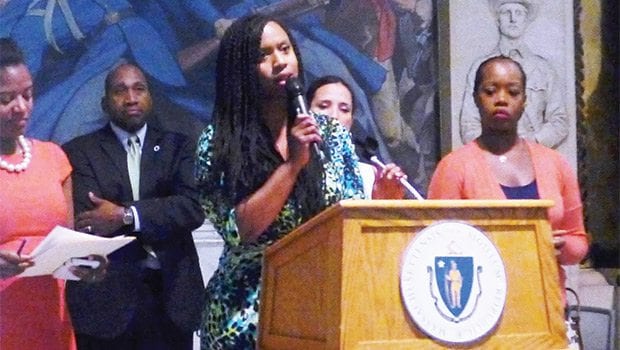Legislature takes a pass on criminal justice reform
Bills advanced by Black and Latino Legislative Caucus remain stuck in committee

Moments after midnight Monday morning, the state legislature ended formal session without taking action on criminal justice and police reforms proposed by the Massachusetts Black and Latino Legislative Caucus made in response to nationwide police brutality.

Author: Photo: Karen MoralesActivists and elected officials rallied outside the House chamber Saturday in support of criminal justice reform measures that the Legislature ultimately did not act on.
On July 11th, members of the caucus and elected officials of color representing Boston drafted a letter acknowledging the violent incidents that occurred in Baton Rouge, Louisiana, Falcon Heights, Minnesota, and Dallas between police officers and African American civilians. The letter, which was revised on July 29th, urged Governor Charlie Baker, Senate President Stanley Rosenberg, Speaker Robert DeLeo and Mayor Martin Walsh to join the legislative body in pushing policy changes that address racial inequality and police brutality.
At the city level, the black, Latino and Asian officials called for implementing body cameras, implicit bias training for officers, civilian review boards and funding for trauma support. At the state level, the letter cited the need for updating law enforcement training, state certification of police officers, comprehensive data collection, and establishing special prosecutors for police-involved shootings.
Holmes said that regulation of ride hailing services such as Uber and Lyft preoccupied legislators the entire weekend and there was not enough time to give the criminal justice reforms the attention it needed.

Author: Photo: Karen MoralesActivists held signs of protest outside the House chamber Saturday in support of criminal justice reform measures.
“We did, however, receive language from the Senate to set up a commission or task force that will look at all policing, officer training, and police-involved shootings,” said Holmes. “We wouldn’t do it for just a year but have it ongoing until 2021.”
“We have made some headway, but we just couldn’t get it done last night,” he said.
On Saturday afternoon, 36 hours before the end of session, approximately 100 people gathered at the State House for a “Speak Out for Racial Justice.” Organized by the Black and Latino Caucus, community members were invited to share their experiences on racial profiling and the criminal justice system.
Each speaker stood at a microphone podium, beside the Spanish-American War Memorial on the third floor lobby of the House Chambers. Among the speakers were Holmes; Rahsaan Hall, director of Racial Justice Program at ACLU; Carl Williams, staff attorney at ACLU; Patricia Montes, executive director of Centro Presente; Ayanna Pressley, councilor at large; and Linda Dorcena Forry, state senator.
“We’re here to talk about transparency, we’re here to talk about accountability, we’re here to talk about trust, we’re here to talk about racial justice,” said Hall amidst claps and shouts of approval from the crowd.
“We have marched, we have mobilized, we have prayed, we have protested,” said Pressley. “We believe the only way we will achieve real change, systemic change, sustainable change, is through policy.”
In addition to sharing personal experiences with racism and law enforcement, community members and local activists endorsed specific bills that would improve the state’s criminal justice system, such as Senate Bill 2424 that would expunge juvenile misdemeanor records and promote transparency and better outcomes for children, and Senate Bill 2176 that would raise the threshold of what would be considered a theft felony from $250 to $1,500.
ACLU attorney Carl Williams said the United States needs a cultural change in how it polices communities.
“It’s not just a problem with the police, or the laws in our country,” he said. “We need to change the culture of this country that assumes black people are dumb, that assumes black people are thugs.”
Holmes said that although the policy changes won’t be looked at again until after Labor Day due to the upcoming campaign season, “We’re appreciative of everyone who showed up [on Saturday] because it did get the attention we needed to let folks know that this is important to our community.”






